How Much Water Should You Drink Per Day
Why Water is Important
The human body is made up of around 60% water.
To function optimally, it relies on this water to ensure that your organs can operate, waste can be expelled, and your blood is healthy and active.
The human body loses a percentage of water every day through passing urine and sweating both as a result of general movement and more vigorous activity and exercise.
Given this, it is important that we replace the water that is lost so that there is no adverse impact on our internal body functions.
Health Benefits of Water
Improves Mental and Physical Performance
It has been suggested that increasing your water intake can help to both give you an energy boost and also support increased brain function.
But how can this possibly be the case?
A recent study concluded that “mild dehydration affects mood in healthy young women.”
This study suggested that those women researched who experienced a loss of fluids in the capacity of around 1-2% also experienced an increased rate of headaches.
This had an adverse impact in terms of their mood, level of motivation, and capacity for identifying and engaging with a task (1).
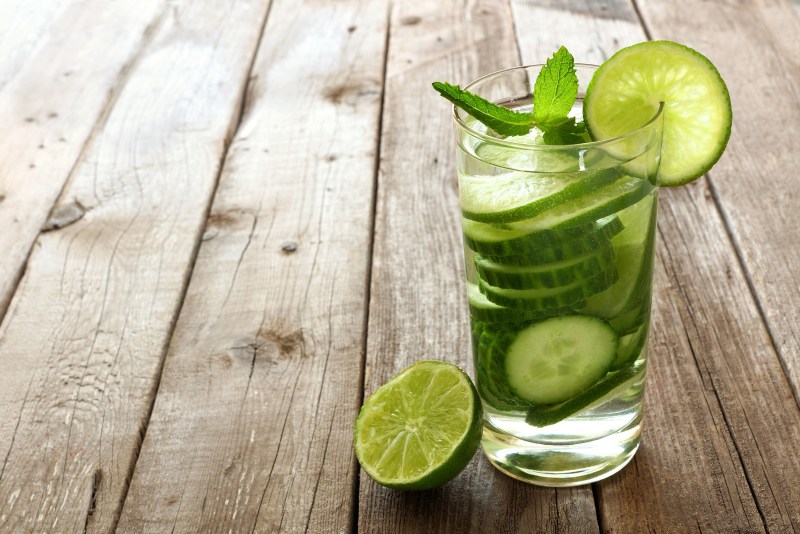
Further studies support this evidence.
In fact, studies that looked at mild dehydration in the order of 1-3% loss of water when compared to the person’s body weight is a good example.
They also showed that the person’s engagement in physical activity such as exercise resulted in a higher body temperature and had a negative impact on their cognitive capability (2, 3, 4).
Other studies have examined the effects of dehydration on the human body’s capacity to operate physically.
Importantly, they have also shown that a lack of water intake can mean that the human body is impaired if it has insufficient hydration.
Not only does this impair your immediate ability to perform the activity, but it also impairs your body’s ability to perform the activity over an extended period.
This is important for athletes and others who engage in endurance sports and activities (5, 6, 7).

Increases Weight Loss
In many diet, weight loss, and health and wellness magazines, you will often see headlines for stories that instruct you to drink more water and stories that convey the link between the consumption of water and steady weight loss.
While you may have read plenty of anecdotal stories about how water can positively impact your weight and how it can help you to shift those unwanted pounds, have you ever wondered whether there was any truth to those claims?
Let’s take a closer look at some studies that have sought to establish such claims.
For example, two recent research studies suggest that yes – if you were to drink around 500 ml of water, you would give your metabolism a boost by around 24-30% (8).
If you look at the diagram below, you will see that in this study the participants drank 500 ml of water and as a result experienced an increased metabolism for around 90 minutes (9).
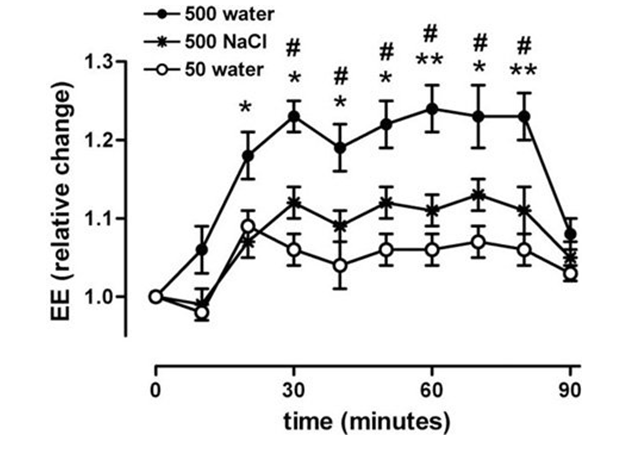
In this particular study, the research scientists determined that if the participants drank around two liters of water each day, positive things happened.
They were able to realize an increase in the amount of energy that they could tap into and use by approximately 96 calories more each day than they would have access to if they had not consumed that water.
Furthermore, the scientists suggested that cold water was more preferable in terms of drinking than hot water.
This is because the body would use energy to cool down the water, which would impact adversely on its ability to increase metabolism for exercise purposes.
They also suggested that drinking water prior to eating a meal would have a positive impact on calorie consumption.
This means that you would not retain as many calories as you would if you had not consumed the water.
This was particularly relevant for older people (10, 11).
Another separate research study program concluded that when people consumed 500 ml of water before each meal every day over a 12-week period, they lost, on average, 44% more weight than those that did not drink this amount of water (12).
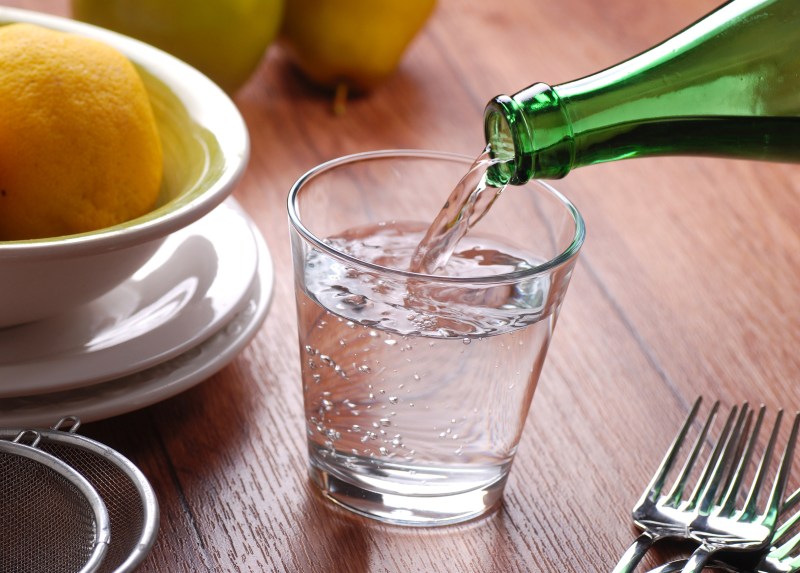
How Much Water Do You Need?
It is suggested and widely accepted that given the volume of water that we need and the amount that our body emits each day, we need to replenish the lost fluid daily to keep hydrated.
To do this effectively, we need to consume somewhere in the order of eight 8-ounce glasses or approximately two liters of water each day.
Conventional Advice
Government authorities with responsibility for health promotion often talk about the 8 x 8 rule or suggest that we sip away on a 2-litre drink bottle through the day.
If you are undertaking strenuous or lengthy physical activity or exercise, you may even choose to drink a little more.
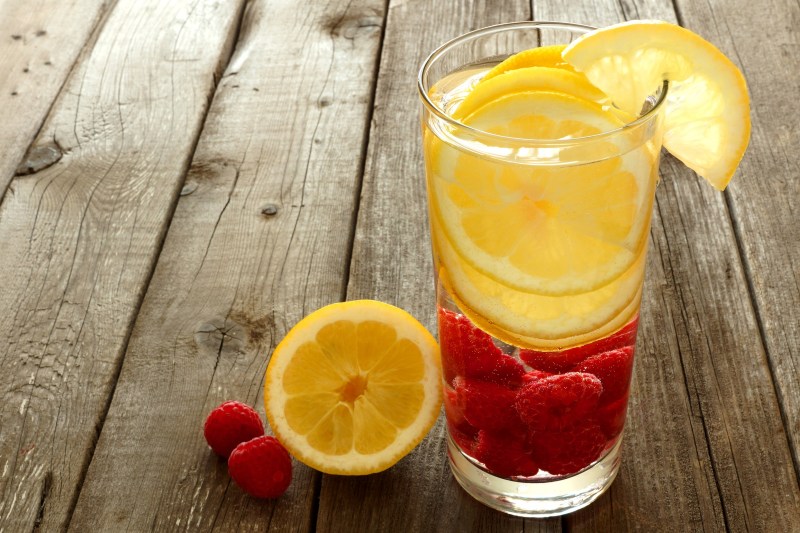
How Much Water You Need
Drinking plenty of water each and every day is essential to your overall health, general well-being, and body weight management.
Interestingly, a recent study concluded that by drinking two cups of water before every meal, you could lose up to five additional pounds per year.
This fact alone should make drinking enough water daily vital to those looking to lose or maintain weight.
Also, drinking the correct amount of water each day can speed up your metabolism and aid in your weight loss efforts.
But how much water should you be drinking daily?
Read the following points to calculate the correct amount of water for you:
- Weight: if you know your weight, you can start the calculation. In fact, the entire equation is based on your weight! This is because a person who weighs more needs to drink more water than someone who weighs less.
- Multiply your weight: take your weight in pounds and multiply it by two-thirds, or sixty-seven percent. The answer will be approximately how many ounces of water you should be drinking each day.
- Activity: even though you have a number, you should now adjust it based on how much exercise you do each day. This is because when you do any activity or exercise, you lose water in the form of sweat. To determine the final number, simply add 12 ounces of water to the total for every 30 minutes of exercise that you do each day. This final number is how much water you need to be drinking each day for optimal health and weight loss maintenance!
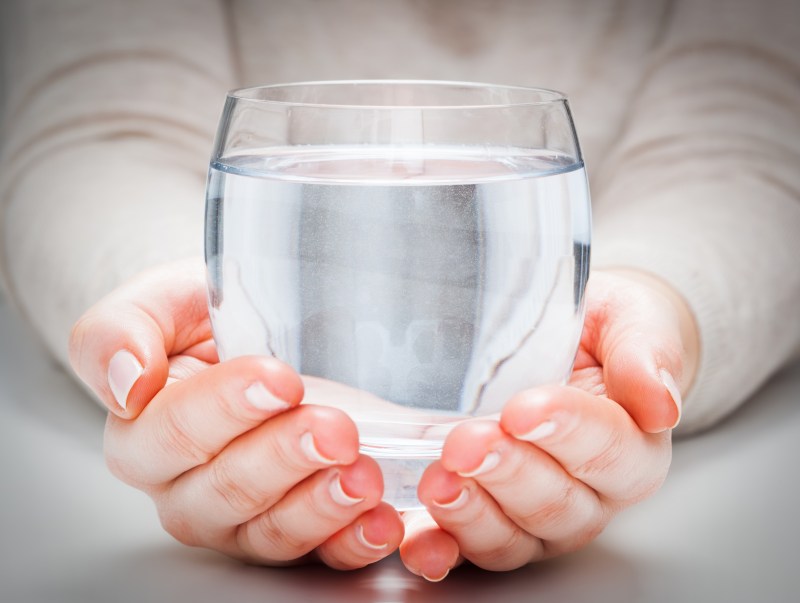
In order to easily identify how much you should drink each day, it is suggested that you look at the following table.
Determine how much you weigh and then follow the table across to determine your recommended water intake per day.
You should make adjustments and increase this amount if you are doing vigorous exercise during a particular day.
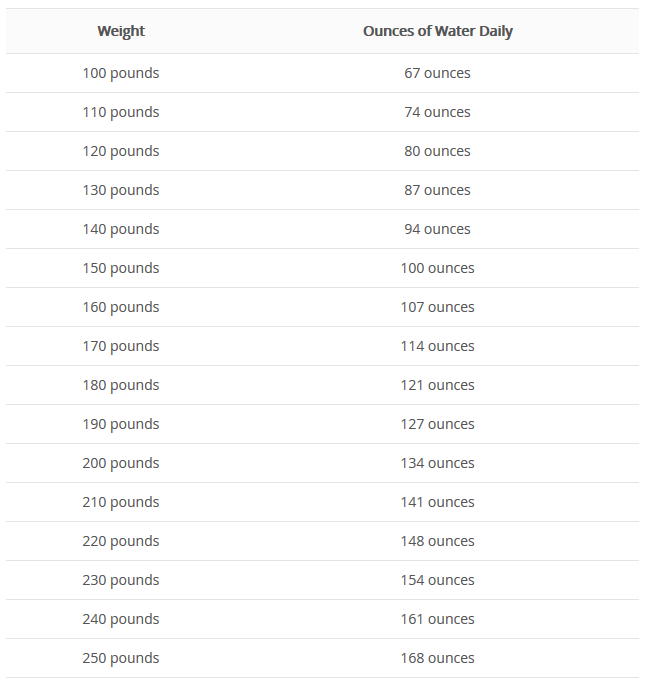
Factors that Influence Water Needs
For the most part, many people don’t need to concern themselves with ensuring that they have the necessary intake of water each day.
Their body will give them the signs that they need fluids, particularly when they tap into the queue that they are feeling thirsty.
In fact, thirst is a major indicator that your body is in need of hydration.
Research shows that this has long been a reliable source of a trigger for humans to drink water (13).
Having said that, there are certain sets of circumstance, which will mean that your body may trigger the need for you to increase your intake of water.
Whether you feel thirstier or not, it is critical that you up your water consumption during such times.
Let’s take a look at some of the more common circumstances you might find yourself in.
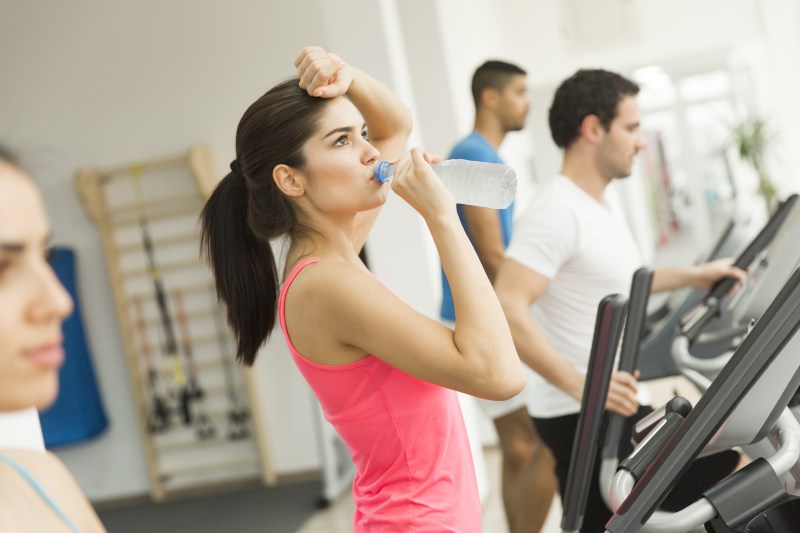
Exercise and Physical Activity
If you engage in exercise and physical activity, then you will find that as you increase your heart rate, your body temperature rises and you will need to drink more.
Not only is it important to cool yourself down and get hydrated to address your increasing thirst, but it is also vital to give yourself the boost you need to keep exercising and supporting increased endurance.
This is particularly true for athletes, who will suffer a loss of electrolytes and will need that replenishment to keep performing at the same level (5, 6, 7).
Environmental Factors
During hot, sticky, and humid weather, you sweat a lot more.
This loss of fluid requires replacement with an extra fluid intake.
This is even true during colder months, when we have the heater turned up high and moisture is lost from our skin causing it to become dry.
Apart from these common factors, if we’re at a high altitude – more than 8200 feet (2500 metres) – we also lose extra fluid because we breathe more rapidly and tend to urinate more often.

Various Health Conditions
As you would expect, the human body can be impacted severely when it succumbs to illness, injury, or chronic disease.
While water is not a cure for ailments, some studies show that if you increase your consumption of water while you are ill or during your recovery, you can support your improved health and well-being.
With this in mind, let’s take a look at some of the more common health problems where water consumption can aid in recovery:
- Constipation: if you find yourself suffering from constipation, studies have shown that by upping your water intake, you can get relief from constipation. Constipation is a common problem, and regular water consumption is one of the keys to its prevention (14, 15, 16).
- Cancer: the benefits of maintaining general health and well-being through a good diet, regular exercise, and daily water consumption all support studies that talk about cancer prevention. Specifically, there are some research studies, which have demonstrated that people who consume more water have a lower risk of bladder and colorectal cancer. Some studies refute this (17, 18, 19, 20).
- Kidney stones: increased water intake appears to decrease the risk of kidney stones (21, 22).
- Acne and skin hydration: while many people can share anecdotal stories about how their water consumption has provided them with clear and glowing skin, there are no studies to support this. Given this, you would probably be best served to monitor your own responses to increased water consumption and how it impacts on your skin’s quality, elasticity, and clearness.
Pregnancy or New Mothers
Pregnant women and breastfeeding mothers need extra fluids to remain hydrated.
This will ensure that they remain healthy and that they can function optimally on a day-to-day basis.
In fact, the Institute of Medicine states that pregnant women should make sure they drink at least 10 cups of fluid a day (2.3 liters); breastfeeding mothers should drink at least 13 cups of fluid per day (3.1 liters).
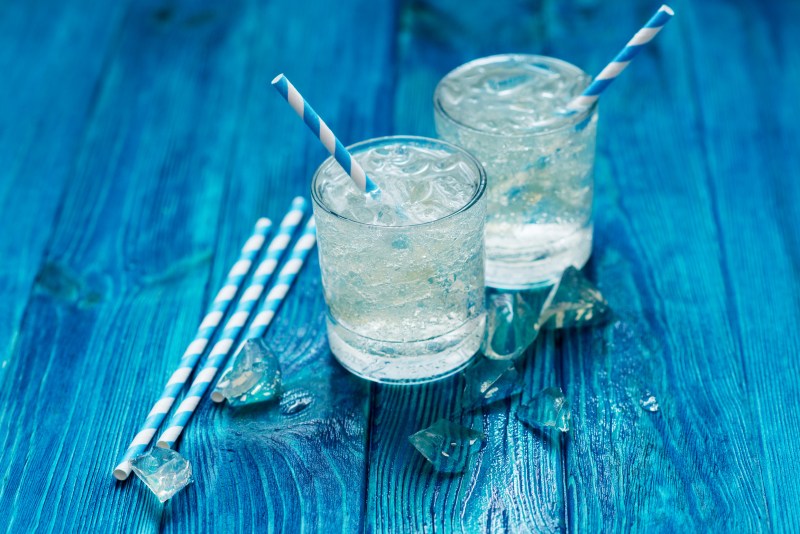
Other Sources of Water
We have discussed the importance of increasing your water consumption each day by adopting an 8 x 8 approach (8 glasses of 8 ounces of water each day).
However, there is no need for you to think that you can only obtain your necessary fluid intake from water alone.
In fact, throughout the day, you can access water from a range of other beverages and foods that you may not have even considered.
Let’s take a closer look at some of the more commonly available options that you can consume and which will, in turn, give you a water intake boost without any effort at all.
Generally speaking, food provides about 20% of your total daily required water consumption intake.
Some foods are higher in their water content than others.
This is evident with fruits and vegetables such as watermelon and spinach, both of which contain around 90% or more water by weight.
Other foods such as meat, fish, and eggs also contain water.
Furthermore, you may not have ever given it much thought, but what you drink throughout the day (aside from water), may also provide you with some degree of your ideal water intake.
As an example, if you consume a glass of juice in the morning or a glass of milk before bed, then you will find yourself also consuming some water because both of these beverages contain a significant portion of it.
You may not have even considered that beer, wine, and caffeinated beverages including coffee or tea also possess water.
Although, before substituting your water intake with those beverages only, you may also want to consider the other contents within those drinks including caffeine, chemicals, and sugar.
However, it is important to point out that studies show that coffee and tea (both of which contain diuretics) are just as effective for water consumption because the diuretic effect in those beverages is actually quite weak (23).
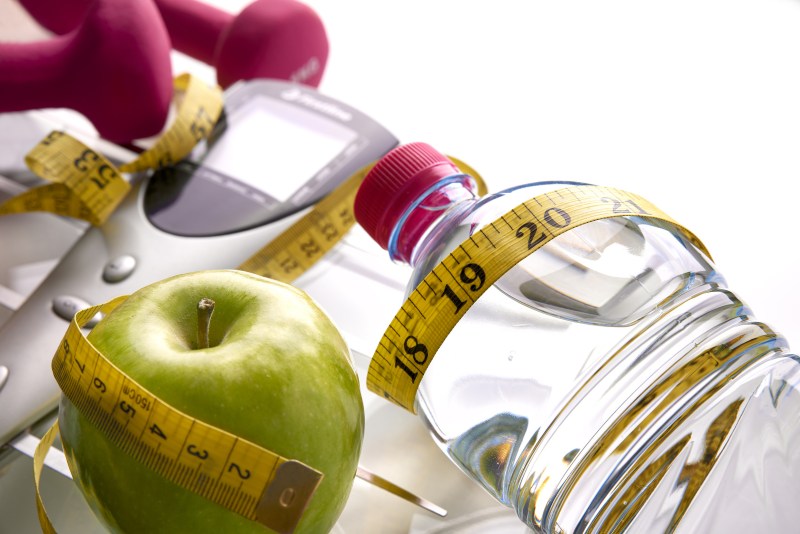
Water and Weight Loss
Many people advocate for the increased intake of water in helping them to lose weight.
Your friends and family may have their own stories to share about adding lemon to their water, drinking a full glass of water before they get out of bed in the mornings, or sipping on water throughout the day.
However, before you jump into a weight loss program, you may like to know about the benefits of water that have been scientifically proven.
As outlined earlier, there are studies that have been conducted which have explored and examined the benefits of water and its effect on people’s ability to lose weight.
A recent study indicated that when its participants were asked to consume 500 ml of water before each meal every day, this led to the loss of 44% more weight in comparison to the others who were not regularly consuming water before eating (12).
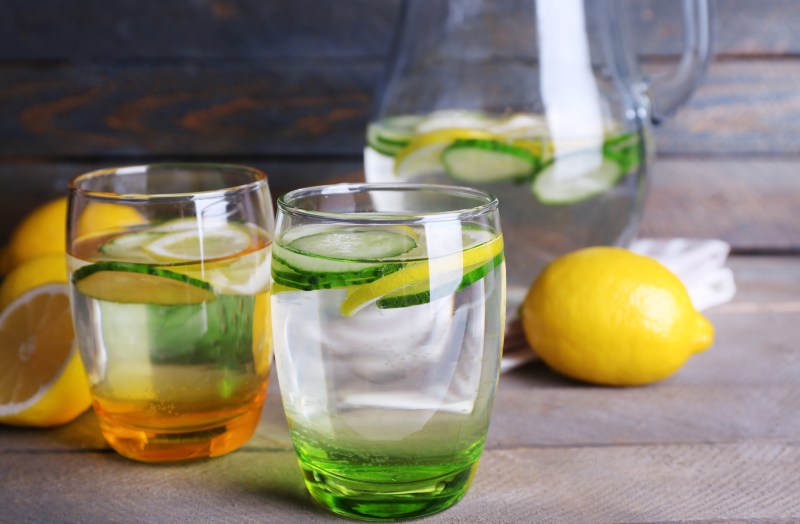
Regular Water Vs Alkaline Water
You might have heard of something called alkaline water.
It’s a type of water that you can buy, and it’s worth looking into what sorts of health benefits, if any, it has.
As with many controversial things, there’s a lot of hyperbole and contradictory evidence out there.
For example, if you’re at a website that is trying to sell you alkaline water, it’ll only cherry-pick the evidence that supports the water being healthy.
On the other hand, if you’re at a serious medical site, it’s more likely to state that alkaline water is not of any significant health benefit at all. Who do you believe?
As we have stated, there is no doubt that drinking water is a good thing.
The health benefits are well enumerated by science, and when we increase our intake of water, we notice an improvement in our general health and well-being.
Of course, the contradictory information out there about alkaline water should be mostly taken with a pinch of salt, so to speak.
Marketing is everywhere, and it’s important to remain as objective as possible.
If you remember that by simply increasing your normal water intake, you are bound to be in a healthier state anyway, you are in a much better position to analyse the claims about alkaline water or any other health product.
Despite the supposed evidence concerning the health benefits of alkaline water, our conclusion is that it does not seem to be any better for the body than simple filtered water.
The truth is that our body is always in a natural alkaline state with a neutral pH.
While you are busy eating, drinking, exercising, and doing anything else, the natural and normal processes of your body is maintaining an alkaline state without needing the extra ingestion of alkaline water or anything else.
The process by which your body maintains alkalinity is called homeostasis.
Once again, your body maintains a naturally alkaline state through the action of homeostasis without any additional branded water.
In fact, the only thing that seems to be true about alkaline water is that it helps to neutralise stomach acid.
This may, in theory, help if you suffer from indigestion, but if you use alkaline water as your only source of fluids on a daily basis, you could be doing yourself more harm than good.
In cases like this, it’s always best to let science have the final word, so you’d be wise to leave alkaline water on the shelf unless science tells you that it is, in fact, beneficial for us.
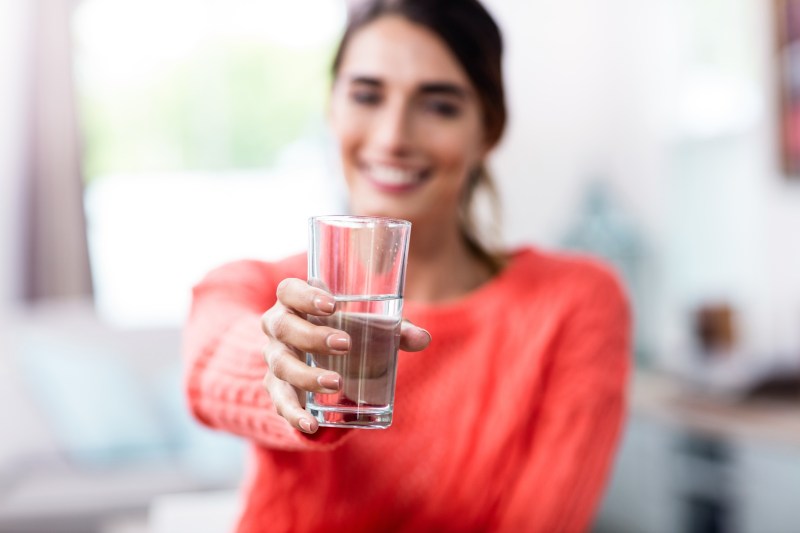
Dangers of Drinking too Much Water
Did you know that it’s actually possible to drink too much water?
While rare, if you drink too much water and your kidneys aren’t able to process and excrete it, then the electrolytes in your blood are diluted to levels that are dangerous for your health.
This condition is called Hyponatremia and is something that endurance athletes, such as marathon runners, need to be careful of when they drink large amounts of water during races.
Tips for Reaching Your Daily Water Goals
You have a final number for the amount of water you should be drinking each day, but how do you make sure that you drink that amount?
It might seem daunting at first, especially if you’re not used to having to drink so much for a specific goal, but if you stick to the following tips, you should find it a lot easier:
- Drink 2 cups: if you drink 2 cups before each meal, you’ll actually eat less. Science has concluded this as a fact, and you really don’t want to argue with science! By drinking those 2 cups before a meal, you’ll feel fuller. This means that you’ll eat less and be able to lose more weight. Doing this before each of your three meals a day also ensures that you’re already partway to your daily drinking goal.
- Morning and night routine: make sure you get into the habit of drinking a cup of water before you go to sleep each night and a cup of water each morning after you wake up. Science has concluded that drinking water before you sleep actually helps to keep your bodily organs hydrated overnight, which is especially important. By getting into this habit, you’re also contributing easily to your daily fluid intake goal.
- Measurement: one way to keep track of your fluid intake is to buy a bottle and use it exclusively for your drinking. For example, if you use a water bottle that can hold 16 ounces and you need to drink 80 ounces of water in a day for your goal, then you only need to fill and empty the bottle five times.
- Flavor: sometimes drinking only water each and every day gets pretty boring. If you want to add some extra flavor without adding to your waistline, try adding some sliced up fruit pieces like lemons, strawberries, and limes. This will add some extra kick without adding to your calorie intake.
- Bubbly: if you want even more variety in your daily fluid intake, why not consider adding some sparkling or carbonated water to your routine? You might even find a zero calorie flavored water brand. Remember: your fluid intake doesn’t have to be boring; you can mix it up if you like! Some people even use SodaStream machines to make their own flavorsome carbonated drinks.
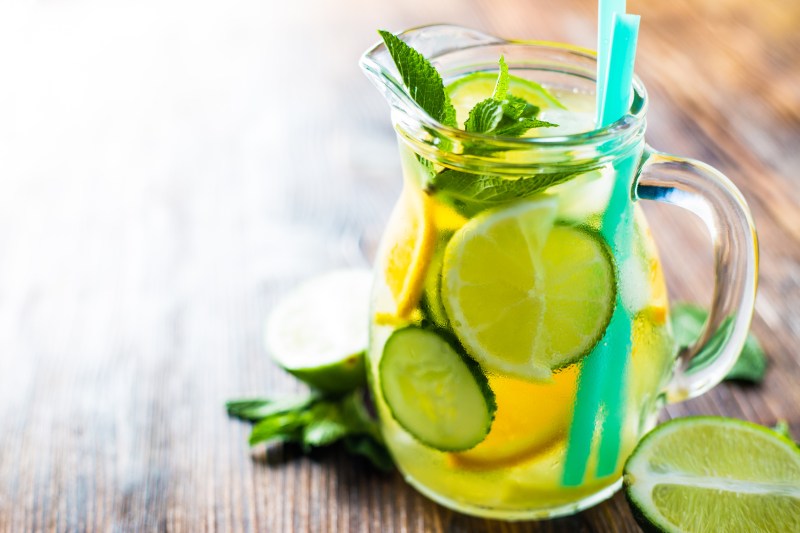
Conclusion
While there is no doubt that drinking water each day does have some positive benefits, the jury is out on exactly how much you should consume and what the absolutely definitive benefits of drinking water are for each person.
On this basis, drinking water each day is personal preference, and the amount you drink is entirely up to you.
To help you decide how to proceed, you should consider some of the things we have discussed in this report, including:
- Drink when you are thirsty
- Stop drinking when you are no longer thirsty
- Drink more when you exercise and on warm days to counteract extra water loss
FDA Compliance
The information on this website has not been evaluated by the Food & Drug Administration or any other medical body. We do not aim to diagnose, treat, cure or prevent any illness or disease. Information is shared for educational purposes only. You must consult your doctor before acting on any content on this website, especially if you are pregnant, nursing, taking medication, or have a medical condition.
HOW WOULD YOU RATE THIS ARTICLE?
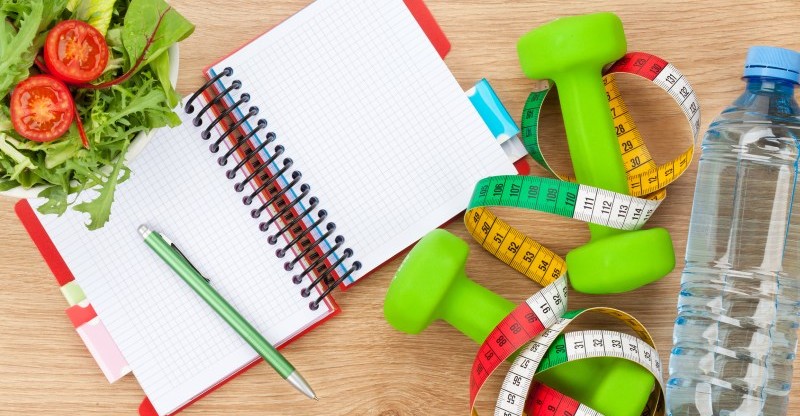


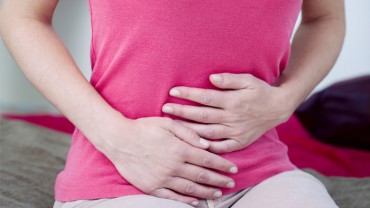

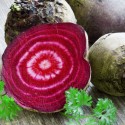

Very informative! Love the weight/water recommendation table!
Thanks a lot Brianne, I’m glad you liked it.
Good to find out that water can come from so many sources. I wasn’t aware of this.
Yes, water is kind of like sugar, it is everywhere :).
I’ve heard from yoga teacher that it is very important to drink this required 2 liters of water every 20-30 minutes during the day…Do you think it will be more helpful for my body???
Hello Helen:) I don’t think you should make yourself drink water if you don’t want. Don’t forget about other sources of liquid.
Two months ago I started drinking the recommended amount of water. I had to literally make myself drink it but then it became a habit. And the amazing results encouraged me to continue. My skin looks better now, I even sleep better!
Do soups count as a part of daily water intake? I find it difficult to drink so much water…
Love this. I am on a high fruit and vegetable diet and love soups/broths. My breakfasts are generally smoothies or porridge/oats. I drink a lot of unsweetened tea and snack on vegetables like cucumber and peppers which have a high water content. For a couple of months I was over-hydrating myself because I added the generally suggested 2L of water to my already relatively high water intake. I thought something was wrong with me because I got up at night several times to wee. It was crazy! I like it that you addressed the fact that you get water from other sources than the obvious glass of water. 2L a day is not the answer for everyone and for some that even isn’t enough. Bio-individuality is overlooked far too much! Also I’d like to add one little thing: dehydration can cause melatonin deficiency which is a major factor when it comes to insomnia.
Hello Gloria! Thank you for your detailed comment! Your addition about melatonin deficiency is really useful!
Does the recommended water intake depend on age?
Are the recommendation about drinking water the same for pregnant women? Wouldn’t I swell if I drink 2l of water every day?
Thanks for sharing tips to help take enough water in the day. I am not used in taking water I’ve been struggling at least starting today I’ll try the tips you have shared to see whether I’ll improve my daily intake.